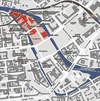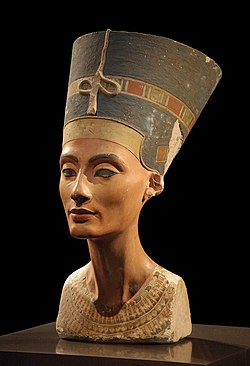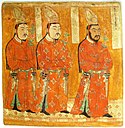Museum für Asiatische Kunst
| Museum für Asiatische Kunst der Staatlichen Museen zu Berlin | |
 Museum für Asiatische Kunst i Humboldt Forum. | |
 Väggmålning från Höhle 9 i Bezeklik i Xinjiang | |
| Information | |
|---|---|
| Typ av museum | Museum |
| Plats | Humboldt Forum, Berlin |
| Adress | Museumsinsel |
| Etablerat | 2006 |
| Museichef | Från 2010 Klaas Ruitenbeek |
| Webbplats | |
| http://www.smb.spk-berlin.de | |

Museum für Asiatische Kunst der Staatlichen Museen zu Berlin grundades 2006 genom en sammanslagning av Museum für Indische Kunst och Museum für Ostasiatische Kunst.[1] Det ingår i Staatliche Museen zu Berlin. Museet var till januari 2017 lokaliserat till Museumszentrum Berlin-Dahlem. Ethnologisches Museum och Museum für Asiatische Kunst ligger sedan 2020 i nya lokaler i Humboldt Forum.
Kunstsamling från Syd-, Sydost- och Centralasien
Samlingen från Syd-, Sydost- och Centralasien tillhörde ursprungligen det 1873 grundade Museum für Völkerkunde (idag Ethnologisches Museum), från 1904 den "Indiska avdelningen". Genom de fyra så kallade "Turfan-expeditionerna" grundades åren 1902–1914 den centralasiatiska samlingen. Efter andra världskriget beslagtogs en stor del av samlingen som krigsbyte av Sovjetunionen. Senare sammanfördes samlingarna 19565/1957 till Dahlem.
Den ostasiatiska konstsamlingen
Wilhelm von Bode grundade 1906 samlingen för ostasiatisk konst i Berlin. Den ställdes så småningom ut på Museumsinsel och flyttade 1924 in i Kunstgewerbe-Museums byggnad, numera Martin-Gropius-Bau.
Efter andra världskrigets slut transporterade den sovjetiska militäradministrationen i Tyskland uppemot 90 procent av samlingen till Sovjetunionen. Dessa föremål finns sedan dess i Eremitaget i Sankt Petersburg. Några objekt har återlämnats till Berlin. Från 1970 användes i Västberlin Museumszentrum Berlin-Dahlem som utställningslokal.
Efter Berlinmurens fall skedde en nyordning av museiorganisationen i Berlin. De båda asiatiska samlingarna sammanfördes 1992 till Dahlem. Åren 2000–2006 fanns Museum für Ostasiatische Kunst, som nu kvarstår som den ostasiatiska konstsamlingen i Museum für Asiatische Kunst.
Den ostasiatiska konstsamlingen har artefakter från Kina, Korea och Japan. Samlingen omfattar omkring 13 000 objekt.
Bildgalleri
- Ostasiatiska konstsamlingen
- Det japanska téhuset
- Resetron för Kangxikejsare
- Porslin från Mingdynastin
Källor
- Denna artikel är baserad på artikeln Museum für Asiatische Kunst på tyskspråkiga Wikipedia.
Noter
- ^ Bildung des Museums für Asiatische Kunst. Arkiverad 27 september 2010 hämtat från the Wayback Machine. Staatliche Museen zu Berlin
Externa länkar
 Wikimedia Commons har media som rör Museum für Asiatische Kunst.
Wikimedia Commons har media som rör Museum für Asiatische Kunst.- Konstsamlingen för Syd-, Sydost- och Centralasien
- Ostasiatiska konstsamlingen
| |||||||||||||||||
|
Media som används på denna webbplats
Författare/Upphovsman: Philip Pikart, Licens: CC BY-SA 3.0
Picture of the Nefertiti bust in Neues Museum, Berlin.
Berlin-Mitte. The Old National Gallery
Interior view of the Museum für Asiatische Kunst, Kunstsammlung Süd-, Südost- und Zentralasien, Berlin-Dahlem.
| Museum für Asiatische Kunst
|
|||
|---|---|---|---|
 |
|||
| Officiellt namn | Museum für Asiatische Kunst | ||
| Moderinstitut | Humboldt Forum | ||
| Plats | |||
| Koordinater | 52° 31′ 03″ N, 13° 24′ 10″ Ö | ||
| Inrättad | 4 december 2006 | ||
| Webbplats | www.smb.museum/museen-einrichtungen/museum-fuer-asiatische-kunst | ||
| Auktoritetsdata | |||
Författare/Upphovsman: Frank Schulenburg, Licens: CC BY-SA 4.0
Fassade des Berliner Schlosses (heute Sitz des Humboldt Forums) in Berlin, Deutschland im September 2022
Imperial throne and three-fold screen. Rosewood with mother-of-pearl lacquer, gold and silver foil and coloured lacquer. Qing Dynasty. Formerly Collection of Fritz Löw-Beer, New York. Located at the Museum für Ostasiatische Kunst, Berlin-Dahlem. The throne and the screen are from the imperial workshops in the beginning of the era of the Kangxi Emperor (1662-1722). The main theme of the decorations is the Taoist concept of the "Western Paradise", which is ruled by the "Queen Mother of the West" (Xiwangmu). The screen shows scenes of mountains, valleys, seas, terraces, lakes, and palaces. Shown is the arrival of the Queen Mother, who is shown riding a phoenix. The eight immortals are awaiting her arrival, they are shown on the screen and again on the throne itself.
| Museum für Asiatische Kunst
|
|||
|---|---|---|---|
 |
|||
| Officiellt namn | Museum für Asiatische Kunst | ||
| Moderinstitut | Humboldt Forum | ||
| Plats | |||
| Koordinater | 52° 31′ 03″ N, 13° 24′ 10″ Ö | ||
| Inrättad | 4 december 2006 | ||
| Webbplats | www.smb.museum/museen-einrichtungen/museum-fuer-asiatische-kunst | ||
| Auktoritetsdata | |||
Författare/Upphovsman: Louis le Grand, Licens: CC BY-SA 3.0
Museum of East Asian Art Berlin
Inside view of Japanese Tea House, located at the Museum für Ostasiatische Kunst, Berlin-Dahlem (see w:de:Museum für Asiatische Kunst).
Författare/Upphovsman: Sansculotte, Licens: CC BY-SA 2.5
Lageplan Museumsinsel Berlin
Uyghur princes wearing Chinese-styled robes and headgear. Bezeklik, Cave 9, 9-12th century CE, wall painting, 62.4 x 59.5 cm. Located at the Museum für Indische Kunst, Berlin-Dahlem.
| Museum für Asiatische Kunst
|
|||
|---|---|---|---|
 |
|||
| Officiellt namn | Museum für Asiatische Kunst | ||
| Moderinstitut | Humboldt Forum | ||
| Plats | |||
| Koordinater | 52° 31′ 03″ N, 13° 24′ 10″ Ö | ||
| Inrättad | 4 december 2006 | ||
| Webbplats | www.smb.museum/museen-einrichtungen/museum-fuer-asiatische-kunst | ||
| Auktoritetsdata | |||

















